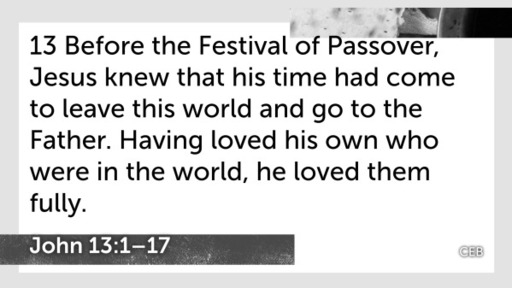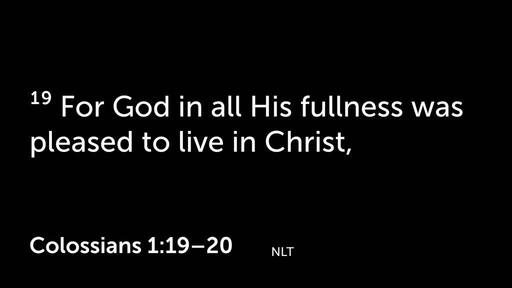Maundy Thursday C
Sermon • Submitted
0 ratings
· 6 viewsNotes
Transcript
Sermon Tone Analysis
A
D
F
J
S
Emotion
A
C
T
Language
O
C
E
A
E
Social
Maundy Thursday, Year C
Maundy Thursday, Year C
May the words of my mouth and the meditations of our hearts be acceptable in Your sight, O Lord, our Rock and our Redeemer. Amen.
Brothers and sisters in Christ: grace to you and peace from God our Father and the Lord Jesus Christ. Amen.
“And when the hour came...” This is one of those phrases that we just kind of skip over, don’t we? It’s not really a phrase that seems all that remarkable. It’s just an introduction to this paragraph. It sets up the timing for their dinner. But seeing it like this leaves out something important: this happened exactly when Jesus knew it would happen. Exactly when God wanted it to happen.
Jesus’ mission among us was nearly complete. He had come to live among God’s children, to endure the temptations of the flesh, to be baptized, and to live the life that God has given to all of us: he laughed and loved, he learned and worked, he taught, and he gave us a perfect example to follow. So now his earthly journey had come to its conclusion. There was only one thing left to do.
But, as was his teaching as well as his behavior, Jesus was faithful to God’s Law. And one of the first teachings of the Law was to faithfully observe the Passover meal - the meal dedicated to remembering that God had saved His people from slavery, oppression, and misery. Passover, pe-SAH in Hebrew, or pascha in Greek - where we get the word “Paschal” from. This is THE feast that the Jewish people celebrate to remember how good God has been to them from the very beginning. And so Jesus instructs his inner circle to prepare this meal so that he can enjoy it with them…even though he knows that he is merely hours away from his own death.
The ritual of the Passover meal remembers the night that the angel of death came to Egypt to kill the firstborn of all households and all flocks and herds - the most precious offspring of any family or animal group. The firstborn is the child who will carry on the family legacy or business, inherit the majority share of the parents’ estate. To lose the firstborn was to suffer a serious loss to the family name.
God’s showed His mercy by giving His people the key to escaping death - the blood of a lamb, sprinkled over the doorway to their house. The lamb was sacrificed to protect the faithful people of God. And the families who obeyed God’s instruction were commanded to use the blood on their doorways, and to eat the flesh of the lamb, and to be ready to follow God’s instructions after death had taken its toll on their enemies. The people did as they were told, and God delivered them from their oppressors.
When Jesus’ first approaches John the Baptist in the 4th Gospel, “Behold, the Lamb of God, who takes away the sin of the world!” (John 1:29, ESV) This is not coincidence. Just as God had freed His people from slavery to the Egyptians, and used a sacrificial lamb to protect them, now He was about to do the same thing again, but this time for ALL of His children, for all time. And this time, the oppression He would save His children from was the oppression of sin and death - those forces which would separate God’s children from Him forever.
In the Exodus, after the Hebrews had been brought to safety, God instructed them to remember this forever, and then He gave them a set of commandments - marking the beginning of a new covenant. This would add on to the covenant of circumcision that God had made with Abraham. Now He had given them rules to live by, and if they would obey those rules, He would bless them.
All of this is of course on Jesus’ mind as he directs his friends to prepare this memorial meal. But this would be no mere annual remembrance. Jesus was about to change this meal forever. He held the meal, as the Heavenly Father directed, but Jesus also redefined the meal, giving it a new focus, and establishing a New Covenant…with his own blood.
While the Jews continue to this day to observe the Passover Feast each year, we continue to observe this new Passover meal. And we do so with far greater frequency…and there’s good reason for that. The original Passover meal represented a one-time event, so it’s quite appropriate to remember that event on its anniversary (which is recorded in Exodus). Jesus’ new meal, however, was not intended to be celebrated annually. Jesus’ instruction to his disciples was this: “Do this to remember me.”
Our tradition tells us that both of our Sacraments (Baptism and Holy Communion) “are used by the Holy Spirit to produce and to sustain faith, [and therefore] they are necessary to salvation...” [Zinck, p. 50] Holy Communion specifically is described in this way: “This Sacrament was instituted by Christ on the night of his betrayal (Luke 22:19, 20). He commanded that it be used as a memorial to him. The divine command is recorded by Matthew, Mark, Luke, and Paul. The earthly elements are bread and wine. The heavenly gifts are the body and blood of Christ, bringing with them the forgiveness of sins… When the communicant receives the bread he also receives the body of Christ; when he receives the wine he also receives the blood of Christ. All communicants receive these blessed gifts… Jesus said: ‘This is my body,’ and, ‘This is my blood.’ These statements should not be rejected, or explained as merely figurative, because they reach beyond our understanding. The Lutheran Church teaches that the glorified Christ is able to be present with his body and blood, wherever the Lord’s Supper is celebrated, and to give them in a real way which we cannot understand, along with the bread and the wine as a pledge of our forgiveness… The Lord’s Supper is not a sacrifice. No other sacrifice for sin is needed than that which Christ offered. He who communes in true penitence and faith may leave the altar with the assurance that he has received the forgiveness of his sins. ‘Where there is remission of sins there are also life and salvation.’” (Zinck, pp. 53-54)
Whoever communes in true penitence and faith may leave the altar with the assurance that they have received the forgiveness of their sins. I don’t know about you, but I take great comfort in that.
Now listen to this part: “St. Paul indicates that only those capable of examining themselves should be permitted to come to the Lord’s Table (I Corinthians 11:28). They should be thoroughly instructed as to the significance of the Sacrament and the blessings it imparts. They should prepare themselves for its reception by prayer and Scripture reading, by self-examination and confession of sin, by true repentance and an earnest desire for forgiveness. Especially should they see that they are in love and charity with their fellow men. No one should commune with hatred in his heart against another, or without seeking the forgiveness of those whom he has wronged.” [Ibid.] This meal is a serious matter. It bestows amazing gifts upon us, and at the same time we are to treat it with great respect and thanks.
Now if we put ourselves in the place of the first people to share THIS meal - those who “reclines at table” with Jesus - do you think they understood what was happening in that meal? Do you think they knew that “this is My Body, given for you…this is My Blood, shed for you” meant that his body and blood would, quite literally, be broken and shed in a matter of hours, and that he would die a horrible, shameful, and painful death… do you think they could put that all together?
The gospel narrative shows us multiple times how the apostles, despite their closeness to Jesus, many times just did not quite grasp everything he was telling them. I personally think they likely thought he was talking about his body and blood as another of his parables…that this was symbolic somehow. I don’t think they really understood that he was actually going to be the Sacrificial Lamb to take away their sins. I think if they *did* know, they would have done what Peter usually does - try to think of a way to avoid it and save their friend and teacher.
But we have the benefit of knowing the rest of the story. We know that the arrest and death of Jesus of Nazareth was a part of God’s plan. We know that Jesus’ death - as horrific as it was - was absolutely necessary to ensure the forgiveness of sins for all of God’s children. We know that this event - Jesus’ death - is so important that the tool of his execution has become the very symbol of our faith. It is the central event of Christianity. It is the reason that we call ourselves “Christian”. And we know that the story does not end on that cross.
We know that this meal that he instituted on that very special night, shortly before his betrayal and arrest, began a New Covenant between God and His children - assuring all of us that our sins can and will be forgiven, if we only repent and confess. We know that when we come to this meal, we are somehow mysteriously united with the apostles at that Passover meal in that upper room so very long ago…and at the same time we are also united with the “great and promised feast” that we will enjoy when Christ comes again.
As important as this meal is, and as powerful as it is to spend time remembering how and when this meal was instituted, this is honestly the secondary purpose of what this day celebrates. The term “Maundy” comes from the Latin word “mandatum” which means commandment. This refers to Jesus’ command to his disciples, immediately after he washed their feet, he said “34 A new commandment I give to you, that you love one another: just as I have loved you, you also are to love one another. 35 By this all people will know that you are my disciples, if you have love for one another.” (John 13:34–35, ESV).
Just as with the first Passover, God instructed His people to make a sacrifice, share a meal, and follow His commands. Jesus has done the very same, except that HE has made the sacrifice, which will be our focus tomorrow.
(The Instruction for Maundy Thursday - from LBW - MDE)
ADVERTISEMENT
Related Media
See moreRelated Sermons
See more

First United Methodist Church • 20 views • 5:26


Bob Schaefer • 14 views


Grace Lutheran Church (correct) • 11 views • 21:52



